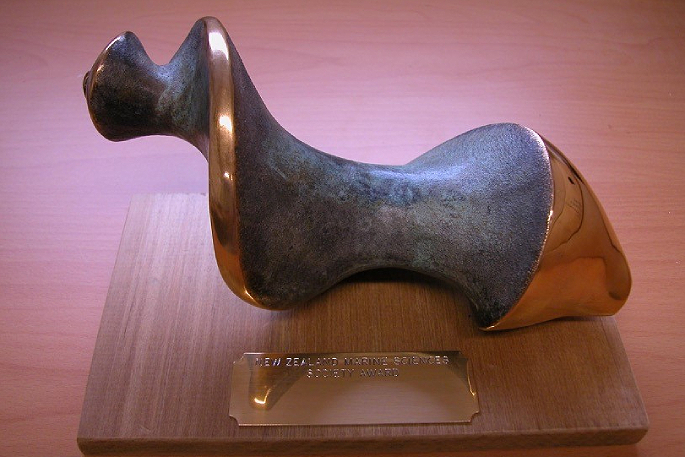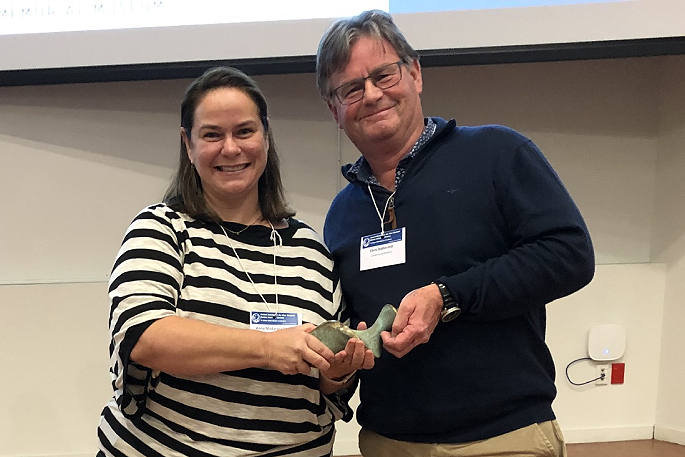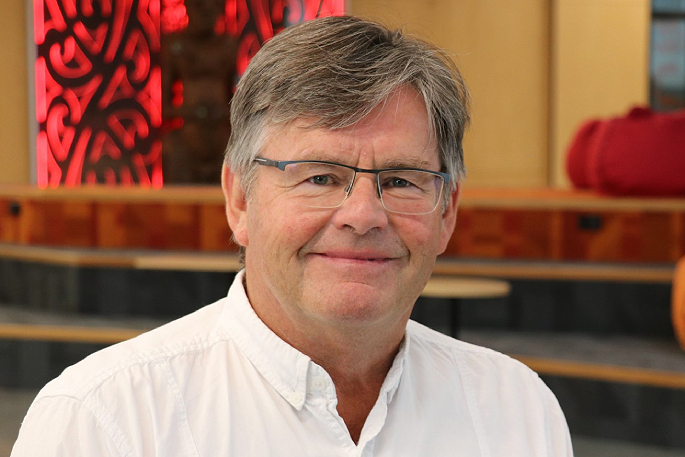Professor Chris Battershill has discovered new sea sponge species, led environmental recovery research around major ocean oil spills, spearheaded international initiatives for marine drug discovery, and taught hundreds of students amongst many other achievements.
He now has another feather for his cap - the world-renowned marine scientist has been honoured for his significant contributions to marine science with a prestigious New Zealand Marine Science Society Life Achievement Award.
“This honour was totally unexpected, I mean totally. I am humbled to say the least, and yet there is still so much more to achieve, especially as our coasts and oceans are under unprecedented stress,” the University of Waikato Professor and BOPRC Chair of Coastal Science says.
Professor Battershill’s biodiscovery work to find new and useful biological compounds for medicines has provided new hope in the fight against many devastating diseases. The work has also brought attention to the urgent need to conserve the very marine biodiversity that is the source of these novel compounds.
He discovered a rare sponge Lissodendoryx, which led to the creation of the late phase breast cancer drug Halaven.
With funding from the United States National Cancer Institute, he led discovery and supply-side teams that contributed multiple antitumor drug leads and the identification of a protein from a New Zealand species of red algae, Griffithsia.
The protein has proved to be a highly effective antiviral for HIV/AIDS and SARS-CoV treatment.
“Being part of an international collective to progress drug leads is an absolute high, as is having one of the sponges named after me by Dame Professor Pat Bergquist (Tedania battershilli), well, that is until I learnt its common name was ‘red slimy’.”
In 2011 Professor Battershill became the public face of the Maritime Response Team responding to the Rena Oil spill off the coast of Tauranga. He coordinated the response and environmental recovery monitoring, notably preventing the large-scale use of dispersants which he knew to be disastrous on marine ecosystems, especially along shorelines. He said of the experience:
 The New Zealand Marine Sciences Society (NZMSS) Award is a bronze sculpture in the form of the internal spire of a gastropod shell (designed and manufactured by Wellington artist Nick Dryden) that comes with an engraved plaque normally presented at the NZMSS annual conference. It carries with it lifetime membership of the Society.
The New Zealand Marine Sciences Society (NZMSS) Award is a bronze sculpture in the form of the internal spire of a gastropod shell (designed and manufactured by Wellington artist Nick Dryden) that comes with an engraved plaque normally presented at the NZMSS annual conference. It carries with it lifetime membership of the Society.
“A positive result was the close relationship that developed with Moana a Toi hapu and iwi. It has opened up so many opportunities, including stepping stones for rangatahi into higher education and importantly marine science.”
Professor Battershill has worked tirelessly with iwi, to understand and support their aspirations around coastal management in the Bay of Plenty.
“Personally, the growth experience from being nurtured by mana whenua in mātauranga Māori has added depth to my understanding of marine systems and how they work, I can only be profoundly grateful.”
Recently, alongside mana whenua, he set up a seawater system and algal culturing facility in Raukokore near East Cape. The centre is working with iwi to generate knowledge and jobs in an often-neglected region and will become an important research hub for the region.
He also currently co-leads the MBIE-funded programme Toka Ākau Toitū Kaitiakitanga - Building a sustainable future for coastal reef ecosystems. The programme has a Mātauranga-Science focus on coastal impacts and sustainable management.
Beyond research, Professor Battershill remains at heart an educator who has had a positive influence on hundreds of students, many who speak of him fondly. He supervises post graduate students and continues to teach at undergraduate level.
 Professor Battershill accepts his award from Ms Anna Madarasz-Smith – President of the NZMSS.
Professor Battershill accepts his award from Ms Anna Madarasz-Smith – President of the NZMSS.
He established the Coastal Marine Research Station in Tauranga and now as Director he continues to shape its evolution. Today the Research Station is host to many postgraduate students from across the world.
Over 50 of the early post graduate students were engaged through the 10-year INTERCOAST programme led by Professor Battershill. The programme was established by the University of Waikato and Bremen University in Germany to create a major centre of marine research excellence in the Bay of Plenty.
With Professor Rocky de Nys in Australia, he led the establishment of the Entrepreneurial University Algal Platform, and is a foundation leader of the Tauranga Moana Biosecurity Capital.
“This award is wonderful recognition of the stellar contributions by Professor Battershill to marine science research, teaching, and community engagement over many years,” says University of Waikato Dean of Science, Professor Margaret Barbour.
“His development of new courses, teaching in lectures, labs and field courses, and understanding of the values of Mātauranga and science, are a model of what a top scientist, teacher and scholar should be. Te Aka Mātuatua - School of Science warmly congratulates Chris on the award.”



1 comment
Congratulations Chris
Posted on 15-08-2023 12:53 | By Cptnscully
Well done Cris You deserve every accolade that comes your way! Bask in the Glory
Leave a Comment
You must be logged in to make a comment.